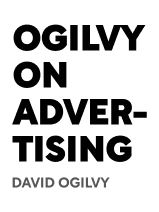

This article is an excerpt from the Shortform book guide to "Ogilvy On Advertising" by David Ogilvy. Shortform has the world's best summaries and analyses of books you should be reading.
Like this article? Sign up for a free trial here .
What are the different types of jobs in advertising? What do people do in these roles?
There are several types of jobs in advertising. There are advertising-specific jobs, like copywriters, as well as jobs that support the agency, like human resources.
Read more about the different types of jobs in advertising and what they do.
Types of Jobs in Advertising
Advertising agencies hire for a variety of positions. Here are some of the different types of jobs in advertising.
Copywriters
Copywriters write the prose that appears in ads or the dialogue in TV commercials. They’re the most important (if not the most visible) people in agencies, but at most agencies, there are half as many copywriters as account executives. (Copywriters usually dislike account executives, and the feeling is mutual. Copywriters think account executives are bullheaded and stupid. Account executives tend to think copywriters are divas.)
To be a successful copywriter, you need the following:
- Curiosity about advertising, psychology, and products
- A sense of humor
- Interest in advertising
- Good writing skills
- Good visual skills (for writing for TV)
- Ambition to succeed (Ogilvy believes most copywriters don’t try hard enough)
- Ability to work hard
- Ability to see an ad as both an art form and a means to selling something
- Ability to manage deadlines and pressure (copywriters have to come up with good ideas quickly)
Art Directors
This is another one of the creative types of jobs in advertising. Art directors are responsible for the images and visuals in advertising. Art director is both a rising and dying job. Rising, because art director skills can transfer to creative director or television production skills, and dying because print is less popular.
To be an art director, you need:
- Formal training in graphic design, photography, and/or film
- Good taste (a bonus)
Account Executives
Account executives act as a liaison with clients and make sure that everyone else in the agency is doing their jobs. They travel and entertain clients (which is less fun than it sounds when they have to deliver bad news).
There are two types of account executives:
- Custodians. These types mainly coordinate—they don’t write ads, do research, find new clients themselves, or come up with ideas.
- Contributors. Contributors are hands-on and come up with ideas.
To be a good account executive, you need the following skills:
- Ability to write and deliver good presentations
- Ability to write clear, concise memos—clients are busy, and if your memos are long and confusing, they might go unread
- Ability to give good, honest advice but let the client make their own choices
- Ability to strategically surrender—let your clients have their way on small things so that, when something big comes up, it’s your turn to get your way
- Respect and keep your distance from your clients—be their friends and buy their companies’ shares, but stay out of their companies’ politics
- Be discreet—maintain confidentiality and don’t talk about your clients in public places
- Resist anxiety—when the agency makes a mistake, clients blame the account executive; when the client make outrageous demands, the agency blames the account executive
It takes years to reach the position and very few people achieve it before they’re 30. To become a successful account executive, Ogilvy recommends the following progression:
- Work for P&G in brand management for two years.
- Work for a consumer research company for a year, aiming to learn how to influence people.
- Join an agency. Learn everything you can about your account. For example, if your account is oil and gas, read books and trade journals, tour facilities, and talk to people in the field.
- Use your knowledge at the opportune moment. For example, when Lever Brothers asked its agencies for a paper on how to use television, most agencies submitted five- to six-page papers, but one account executive prepared a detailed 170-page report. He was quickly elected to the agency’s board of directors.
Researchers
Researchers study what makes people read, watch, or remember ads, and what makes ads sell.
To be a successful researcher, you need the following:
- Formal training (probably a degree) in psychology or statistics
- An analytical mind
- Report-writing ability
- An ability to work with people who don’t like you (creative people tend to dislike research)
- Honesty—your reports can’t be biased
Media Buyers
People who work in the media department buy and negotiate for time and space in media outlets.
To succeed in the media department of an agency, you need:
- An analytical mind
- An ability to negotiate
- An ability to make data accessible
- Resilience
Creative Directors
Creative directors oversee the production of ads.
To be a good creative director, you need the following:
- Psychology skills
- Administrative skills
- Strategic skills
- HR skills
- Good presentation skills
- Graphic design skills
- Proficiency in all media
- Ability to work fast and hard
- Ability to use research
- Ability to maintain composure
- Ability to share credit and take blame
- Enthusiasm
- High standards
Applying for a Job
When you apply for all types of jobs in advertising, mail your resume and letter to agencies (don’t phone them). Here are some tips for writing a strong letter:
- Type it.
- Spell the agency’s name right.
- Write clearly and lucidly.
- Right at the beginning of the letter, state the position you’re applying for and whether you’re responding to a help-wanted ad or recommendation.
- Talk about your qualifications (Shortform example: Cite your degree in graphic design) rather than abstractions (ambition).
- Be polite but personal. Your letter should have the same tone you would use if speaking to someone in a professional context.
- End the letter by saying that you’ll call the agency to set up an interview if they’re interested. Don’t make the agency get in touch with you—people are busy. Make it as easy as possible for them to interview you.
Keeping Your Job
Previously, it was very easy to get fired from an advertising agency. For example, one year, Stirling Getchel had a turnover rate of 137%. At the time of writing, however, most people who left agencies did so voluntarily.
This guide for types of jobs in advertising can help you find your place in the industry.

———End of Preview———
Like what you just read? Read the rest of the world's best book summary and analysis of David Ogilvy's "Ogilvy On Advertising" at Shortform .
Here's what you'll find in our full Ogilvy On Advertising summary :
- What the "father of advertising" has learned from his decades' of experience
- How to craft easy-to-understand ads that work
- The 6 pioneers of the advertising industry






